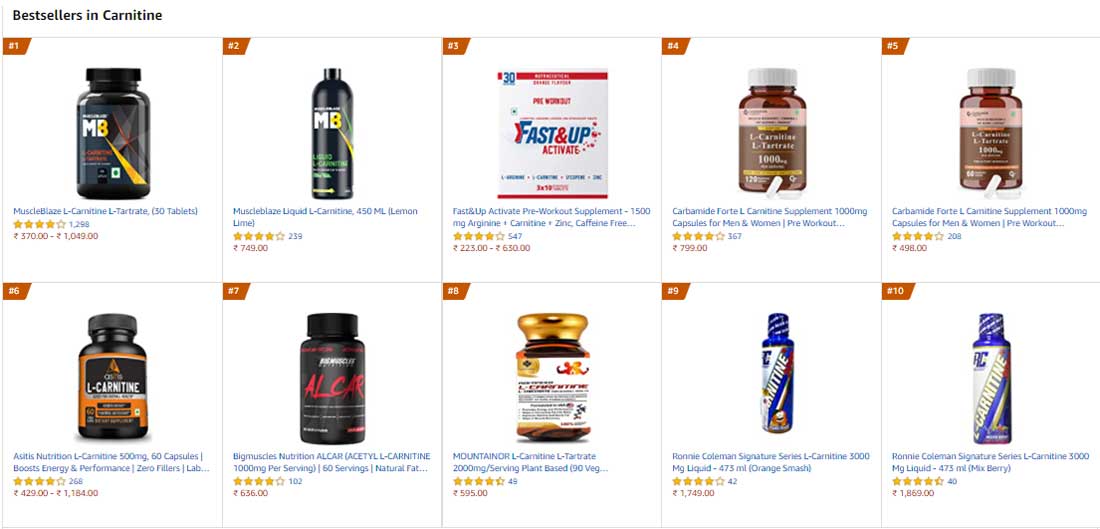L-Carnitine (L-C) has a long history of appearing and disappearing from the bodybuilding markets. It appeared first in 1980, vanished when stimulant-based fat burners appeared on the scene. Once their novelty value diminished, L-C again became the champion. Old timers never forgot the benefits and always bring it forward.
Part fat-burner and part performance supplement, L-C has plenty of fans. Now we know this well-researched supplement not only aids in fat-burning, but also has the potential to enhance exercise performance and recovery.
Before beginning to analyze let us find more about this L-C.

What is L-Carnitine?
Though categorized as amino acid, L-C is not technically so. It is considered as “vitamin-like” and “amino-like” compound related to B Vitamins. It forms in the liver & kidneys from the amino acids Lysine and Methionine but stored elsewhere, primarily in muscles and the brain. In diets it mainly occurs in meat and other animal products. Some minimal quantities can also be derived from plants like Avocado and Soyabeans but the established source is meat – the redder the better.
Twin Forms of Carnitine
Carnitine comes in two forms, D & L. The latter is natural and biologically active. The D form is inactive and never sold as supplement. Acetyl L-Carnitine is another popular supplemental form of L-C. Found throughout the central nervous system it plays a role in producing energy and neurotransmitter acetylcholine.
The Benefit of the Acetyl Group Attachment
Studies indicate the acetyl group attached to the carnitine molecule enhances its ability to pass across the blood-brain barrier and enter the brain, where it acts as a powerful antioxidant. The result derived is that acetyl-L-C may provide protective actions against aging processes and neurodegeneration.
What does L-Carnitine Do
The only critical role that L-C plays is in helping to transport fat, particularly long-chain fatty acids, into the mitochondria of cells. Then they can be oxidized—used as fuel—to generate adenosine triphosphate, or ATP. L-C does this cellular work when you exercise.
Without adequate L-C, most dietary fats can’t get into the mitochondria and be burned for fuel. But for people with L-C deficiency it is a serious medical condition whose implications don’t stop at being unable to burn body fat. It can lead to muscle weakness, stunted growth, an enlarged liver etc. This is one reason why L-C is considered a “conditionally essential” nutrient: Your body produces it, but if it doesn’t produce enough, your health can be seriously impacted.
During bulking periods LC can help limit fat gains and make a cleaner bulk. But if you are cutting, it helps transporting the fat you have in your cellular furnaces to get burned as energy. So this fat burning capability is well established.
What Are the Findings from Research Studies?
A latest research focused on how L-C can enhance athletic performance. The researchers had one group of athletes consume 2 grams of L-C along with 80 grams of a high-glycemic carb first thing in the morning and four hours later for 24 weeks. Another group only took the carbs.
The result was, the subjects taking L-C burned 55 percent less muscle glycogen, while increasing fat-burning by 55 percent. During high-intensity cycling, the subjects taking L-C had lower levels of lactic acid and higher levels of creatine phosphate, one of the primary building blocks of ATP.
The fatigue resistance test had marvelous results. They found subjects taking L-C covered 25% longer as they burned more fat while preserving muscle glycogen and this was in addition to lower levels of lactic acid and higher levels of creatine phosphate.
The best part was that despite having an extra 640 calories of fast-digesting carbs in their daily diet, the subjects taking L-C gained no additional body fat. The other who took carbs without L-C, gained more than 5 pounds of body fat.
What Are The Additional Benefits of L-Carnitine
L-C enhances the muscle blood flow which means needed nutrients and hormones reach where necessary during exercise. Moreover it increased the number of testosterone receptors inside muscle cells which in turn can bind more testosterone and stimulate muscle growth and strength gains.
What is the Optimum L-Carnitine Dosage for Effective Results
Even though 1 gram of L-C can be effective, it is best to have 2-3 grams along with 30-40 grams of carbs and 20-40 grams protein, that too with a meal.
On the contrary, Acetyl-L-Carnitine is easily absorbed by the intestines and muscle cells in absence of food. Hence, this form of L-C can be stacked with other nutrients that enhance fat-burning, such as caffeine, green tea and can also be taken between meals.









